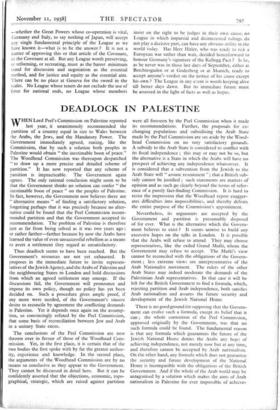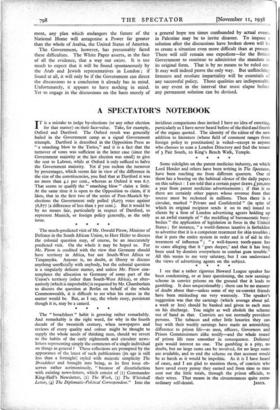DEADLOCK IN PALESTINE
WHEN Lord Peel's Commission on Palestine reported last year, it unanimously recommended the partition of a country equal in size to Wales between the Arabs, the Jews, and the Mandatory Power. The Government immediately agreed, stating, like the Commission, that by such a solution both peoples in Palestine would obtain "the inestimable boon of peace." The Woodhead Commission was thereupon despatched "to draw up a more precise and detailed scheme of partition." It has now reported that any scheme of partition is impracticable. The Government again agrees. The only rational conclusion might seem to be that the Government thinks no solution can confer "the inestimable boon of peace" on the peoples of Palestine. In fact, however, the Government now believes there are "alternative means" of finding a satisfactory solution, forgetting perhaps that it was precisely because no alter- native could be found that the Peel Commission recom- mended partition and that the Government accepted its recommendation. The problem of Palestine is therefore just as far from being solved as it was two years ago ; or rather farther—farther because by now the Arabs have learned the value of even unsuccessful rebellion as a means to avert a settlement they regard as unsatisfactory.
Thus deadlock seems to have been reached. But the Government's resources are not yet exhausted. It proposes in the immediate future to invite represen- tatives of the Jewish Agency, and the Arabs of Palestine and the neighbouring States to London and hold discussions from which an agreed settlement may emerge. If the discussions fail, the Government will pronounce and impose its own policy, though no policy has yet been decided on. Such a procedure gives ample proof, if any more were needed,- of the Government's sincere desire to reconcile by agreement the conflicting demands in Palestine. Yet it depends once again on the assump- tion, so convincingly refuted by the Peel Commission, that some basis of reconciliation between Jew and Arab in a unitary State exists.
The conclusions of the Peel Commission are now thrown over in favour of those of the Woodhead Com- mission. Yet, in the first place, it is certain that of the two bodies the first spoke with by far the greater author- ity, experience and knowledge. In the second place, the arguments of the Woodhead Commission are by no means so conclusive as they appear to the Government. They cannot be discussed in detail here. But it can be confidently asserted that the objections, economic, topo- graphical, strategic, which are raised against partition were all foreseen by the Peel Commission when it made its recommendations. Further, the proposals for ex- changing populations and subsidising the Arab State made by the Peel Commission are set aside by the Wood- head Commission on no very satisfactory grounds. A subsidy to the Arab State is considered to conflict with its fiscal independence ; this may or may not be so, but the alternative is a State in which the Arabs will have no prospect of achieving any independence whatsoever. It is considered that a subvention from the Jewish to the Arab State will "arouse resentment "; that a British sub- sidy cannot be justified ; such statements are matters of opinion and as such go clearly beyond the terms of refer- ence of a purely fact-finding Commission. It is hard to resist the impression that the Woodhead report exagger- ates difficulties into impossibilities, and thereby defeats the entire purpose of the Commission's appointment.
Nevertheless, its arguments are accepted by the Government and partition is presumably disposed of for ever. What is the alternative which the Govern- ment believes to exist ? It seems unwise to build any excessive hopes on the talks in London. It is possible that the Arabs will refuse to attend. They may choose representatives, like the exiled Grand Mufti, whom the Government may refuse to accept. The Mufti's view cannot be reconciled with the obligations of the Govern- ment; less extreme views are unrepresentative of the Arab Nationalist movement. The rulers of the other Arab States may indeed moderate the demands of the Palestinian Arab representatives. In that case it will be left for the British Government to find a formula, which, rejecting partition and Arab independence, both satisfies Arab nationalism and assures the future security and development of the Jewish National Home.
There is no good ground for supposing that the Govern- ment can evolve such a formula, except its belief that it can ; the whole contention of the Peel Commission, approved originally by the Government, was that no such formula could be found. The fundamental reason is that any formula which guarantees the future of the Jewish National Home denies the Arabs any hop: of achieving independence, not merely now but at any time, and therefore cannot be accepted by Arab nationalism. On the other hand, any formula which does not guarantee the security and future development of the National Home is incompatible with the obligations of the British Government. And if the whole of the Arab world may be antagonised by a solution which makes the aims of Arab nationalism in Palestine for ever impossible of achieve- ment, any plan which endangers the future of the National Home will antagonise a Power far greater than the whole of Arabia, the United States of America.
The Government, however, has presumably faced these difficulties. The White Paper asserts, in the face of all the evidence, that a way out exists. It is too much to expect that it will be found spontaneously by the Arab and Jewish representatives in London ; if found at all, it will only be if the Government can direct the discussions to a conclusion it already has in mind. Unfortunately, it appears to have nothing in mind. Yet to engage in the discussions on the basis merely of a general hope ten times confounded by actual event, in Palestine may be to invite disaster. To impose a solution after the discussions have broken down will be to create a situation even more difficult than at present. There will still remain one expedient—for the British Government to continue to administer the mandate in its original form. That is by no means to be ruled out. It may well indeed prove the only way. But unflinching firmness and resolute impartiality will be essentials of any successful policy. Those qualities are indispensable in any event in the interval that must elapse before any permanent solution can be devised.











































 Previous page
Previous page